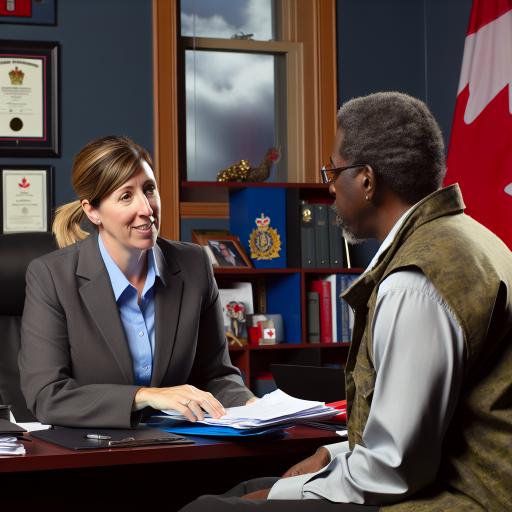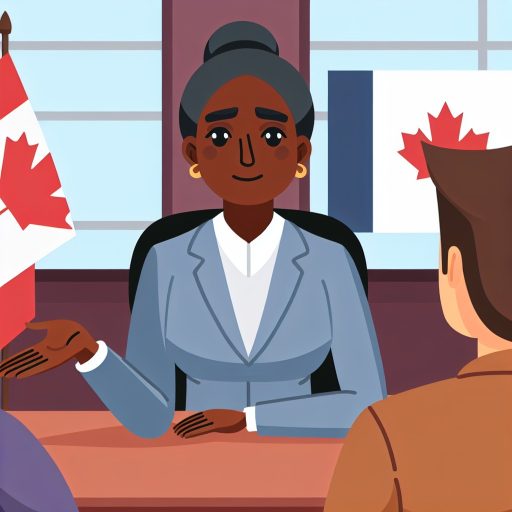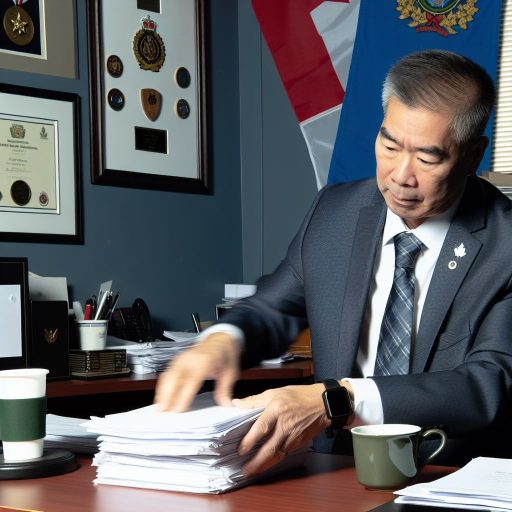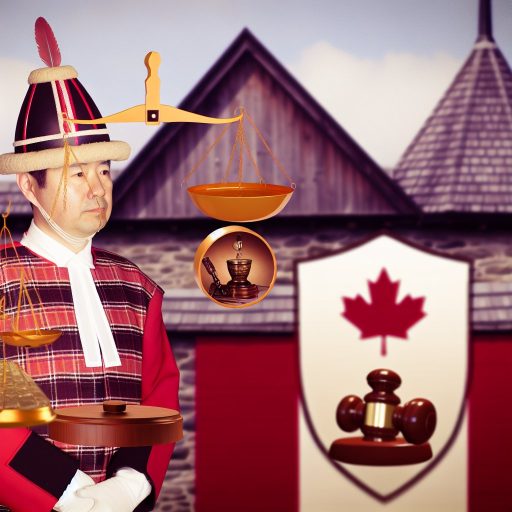Role of Veterans Affairs Officers in Supporting Former Military Personnel and Their Families
Direct Support to Veterans
Veterans Affairs Officers provide essential support to former military personnel.
They help navigate the complex benefits systems available to veterans.
Moreover, they assist in accessing medical care and rehabilitation services.
Veterans can contact these officers for guidance on financial aid programs.
Additionally, these officers offer support with employment resources and job training.
They empower veterans to transition successfully into civilian life.
Advocacy and Representation
These officers advocate for the rights and needs of military veterans.
They ensure veterans’ voices are heard in policy discussions and reforms.
They represent veterans’ interests at local and national government levels.
This advocacy promotes awareness of veterans’ issues within society.
Furthermore, they help in organizing community support initiatives.
Resources for Families
Veterans Affairs Officers also support families of military personnel.
They provide information on mental health services for family members.
Family support programs are essential for maintaining family unity.
Moreover, these officers offer resources for dealing with grief and loss.
They work closely with organizations that assist military families.
This support helps families cope with the challenges of military life.
Community Engagement
Veterans Affairs Officers engage actively with local communities.
They organize events to promote understanding of veterans’ experiences.
Community outreach fosters connections between veterans and civilians.
These efforts highlight the contributions of veterans to Canadian society.
Engagement activities also create opportunities for volunteer support.
Training and Development
Ongoing training for Veterans Affairs Officers is crucial for effectiveness.
They receive updates on policy changes and new resources available.
Specialized training enhances their ability to support diverse veteran needs.
Unlock Your Career Potential
Visualize a clear path to success with our tailored Career Consulting service. Personalized insights in just 1-3 days.
Get StartedThis development ensures they remain knowledgeable advocates for veterans.
Continual learning helps them adapt to emerging challenges effectively.
Impact of Veterans Affairs Officers on Mental Health Services for Veterans
Role of Veterans Affairs Officers
Veterans Affairs Officers play a crucial role in supporting former service members.
They serve as advocates for mental health services that veterans often need.
These officers provide valuable information about available resources.
Additionally, they facilitate access to crucial mental health care.
Challenges Faced by Veterans
Many veterans experience mental health issues after their service.
Common challenges include PTSD, anxiety, and depression.
The transition to civilian life can be particularly difficult.
These challenges often exacerbate existing mental health problems.
Enhancing Mental Health Services
Veterans Affairs Officers work diligently to improve mental health services.
They collaborate with community organizations for better support.
Furthermore, they help to bridge gaps between veterans and healthcare providers.
Providing Personalized Care
These officers tailor their services to meet individual needs.
They conduct assessments to identify specific mental health requirements.
This personalized approach enhances the support provided to veterans.
Raising Awareness and Reducing Stigma
Veterans Affairs Officers advocate for awareness around mental health issues.
They work to reduce the stigma associated with seeking help.
By promoting mental health resources, they encourage veterans to reach out.
This outreach fosters a sense of community and support.
Continuous Support and Follow-Up
Post-service, continuous support is essential for veterans.
Veterans Affairs Officers ensure follow-up services are available.
This ongoing support helps maintain mental health stability.
Consequently, veterans feel more connected and less isolated.
Veterans Affairs Officers and Their Contribution to Community Reintegration Programs
Understanding the Role of Veterans Affairs Officers
Veterans Affairs Officers serve as vital resources for returning service members.
Their expertise helps navigate the complexities of reintegration into civilian life.
These officers provide tailored support to address individual veterans’ needs.
In many cases, they connect veterans with necessary services and benefits.
This guidance fosters a smoother transition into the community.
Providing Emotional and Psychological Support
Veterans often face emotional challenges after military service.
Officers play a crucial role in providing mental health resources.
They help veterans access counseling and support groups.
Additionally, their presence reduces feelings of isolation.
With their support, veterans find it easier to share experiences.
Facilitating Skill Development and Employment Opportunities
Veterans Affairs Officers understand the importance of employment.
They offer job training programs tailored to veterans’ skills.
These programs help veterans transition into the workforce effectively.
Officers also connect veterans with potential employers.
This proactive approach opens doors to meaningful careers.
Community Integration Initiatives
Community reintegration initiatives promote social connections for veterans.
Veterans Affairs Officers coordinate events and activities.
Such initiatives encourage veterans to engage with their communities.
Building relationships fosters a sense of belonging.
Moreover, these connections enhance veterans’ overall well-being.
Advocacy and Awareness
Veterans Affairs Officers advocate for veterans’ rights and needs.
They raise awareness about the challenges faced by veterans.
Additionally, they collaborate with other organizations to enhance support.
This advocacy leads to policy improvements and resource access.
Ultimately, their efforts create a more supportive environment for veterans.
Delve into the Subject: Role of Correctional Officers in Rehabilitation Programs
Importance of Advocacy and Representation by Veterans Affairs Officers for Veterans’ Rights
Proper Representation
Veterans Affairs Officers provide essential representation for veterans.
They advocate for the rights and benefits entitled to those who served.
This representation ensures veterans’ voices are heard effectively.
Moreover, it fosters trust between veterans and governmental institutions.
Legal Advocacy
These officers navigate complex legal matters on behalf of veterans.
They help veterans understand their rights under existing laws.
Additionally, they assist in claims and appeals processes.
This support can significantly impact veterans’ access to benefits.
Emotional Support
Advocacy extends beyond legal representation.
Veterans Affairs Officers offer emotional support to veterans in need.
This support can help reduce feelings of isolation among veterans.
Moreover, it encourages them to seek necessary help.
Community Engagement
These officers play a vital role in community outreach.
They organize events to raise awareness about veterans’ issues.
Such initiatives can connect veterans with local resources.
Furthermore, they promote understanding and appreciation within society.
Highlighting Challenges
Veterans face unique challenges upon returning to civilian life.
Officers bring attention to issues such as employment and mental health.
By addressing these challenges, they help create supportive environments.
This ultimately leads to improved quality of life for veterans.
You Might Also Like: Environmental Officer Salary and Job Outlook in Canada
The Historical Evolution of the Role of Veterans Affairs Officers in Canada
Origins of the Role
The role of Veterans Affairs Officers in Canada began after World War I.
During this time, the government recognized the need to support returning soldiers.
Initially, their primary function was to assist with reintegration into civilian life.
They helped veterans access services like healthcare and education.
Post-World War II Developments
Following World War II, the scope of Veterans Affairs Officers expanded significantly.
The number of returning veterans increased dramatically.
In response, the government enhanced benefits and services for these individuals.
Officers played a critical role in navigating these new systems.
Changes in Public Perception
In the 1960s and 70s, societal attitudes toward veterans evolved.
Public acknowledgment of their sacrifices became more prominent.
Veterans Affairs Officers increasingly became advocates for veteran rights.
This shift marked a significant change in their responsibilities.
Modern Role and Challenges
Today, Veterans Affairs Officers face numerous challenges.
The needs of veterans have become more complex over time.
Issues such as mental health and homelessness are pressing concerns.
Officers work closely with various organizations to address these issues.
Continued Importance in Society
The role of Veterans Affairs Officers remains essential in Canadian society.
They provide vital support and resources to those who served.
These officers ensure that veterans receive the respect and care they deserve.
Ultimately, their work strengthens the social fabric of the nation.
Gain More Insights: Top Challenges in the Veterans Affairs Officer Profession

Challenges Faced by Veterans Affairs Officers in Delivering Services Effectively
Overwhelming Workloads
Veterans Affairs Officers frequently handle heavy caseloads.
This situation often leads to stress and burnout.
As a result, officers struggle to provide timely assistance.
Consequently, veterans may receive delayed support.
Inadequate Resources
Many offices lack sufficient resources to meet demand.
This shortage limits the officers’ ability to assist veterans effectively.
Without proper funding, programs face significant setbacks.
Thus, veterans experience gaps in necessary services.
Complex Government Policies
The bureaucratic nature of government policies complicates service delivery.
Veterans Affairs Officers often navigate intricate regulations.
Understanding these policies can be overwhelming and time-consuming.
Consequently, officers may find it challenging to provide accurate information.
Communication Barriers
Effective communication remains essential for service success.
However, language barriers hinder interactions with diverse veterans.
Additionally, some veterans may struggle with understanding the process.
This lack of clarity can impede their access to vital services.
Emotional Impact of the Role
Officers face emotional challenges when supporting veterans in distress.
Their role requires them to be empathetic and understanding.
This emotional investment can take a toll on the officers’ mental health.
Thus, coping strategies become vital for sustaining their well-being.
Gain More Insights: Importance of Correctional Officers in the Justice System
Collaboration between Veterans Affairs Officers and Other Organizations for Veteran Support
Building a Network of Support
Veterans Affairs Officers engage in partnerships with various organizations.
These alliances enhance the support network for veterans.
For example, local non-profits focus on specific needs.
They often provide services such as job placement and housing assistance.
Collaboration fosters resource sharing among different entities.
As a result, veterans receive comprehensive assistance.
Creating Holistic Programs
Joint initiatives lead to holistic programs for veterans.
Such programs address mental health, employment, and social integration.
Organizations like the Canadian Mental Health Association contribute expertise.
Veterans Affairs Officers help coordinate these efforts effectively.
In turn, this ensures veterans’ diverse needs are met.
Facilitating Workshops and Events
Workshops and community events play a significant role in veteran support.
Collaboration allows for the organization of these valuable activities.
Veterans Affairs Officers assess the needs of their communities.
Consequently, they develop workshops that provide resources and skills.
Events also facilitate networking among veterans and local businesses.
Advocating for Legislative Change
Collaboration empowers advocates to push for legislative changes.
Veterans Affairs Officers work with legal aid organizations.
This partnership aims to address policy gaps affecting veterans.
Through combined efforts, they raise awareness about key issues.
Ultimately, this advocacy leads to improved services and benefits.
Case Studies Highlighting Successful Interventions by Veterans Affairs Officers
Supporting Mental Health Initiatives
Veterans Affairs Officers played a crucial role in mental health interventions across Canada.
For instance, Officer Laura Chen coordinated outreach programs for veterans facing mental health challenges.
These programs provided critical support and a strong community network.
As a result, many veterans reported improved mental well-being.
Moreover, community workshops facilitated open discussions about mental health.
This initiative significantly reduced the stigma surrounding veterans’ mental health issues.
Facilitating Employment Opportunities
Veterans Affairs Officers have been instrumental in helping veterans transition to civilian jobs.
For example, Officer Mark Thompson partnered with local businesses to create job fairs.
These fairs specifically targeted veterans seeking employment.
Consequently, many veterans gained meaningful job placements.
Additionally, tailored resume workshops were offered to enhance job readiness.
Veterans felt more prepared to navigate the job market effectively.
Enhancing Educational Access
Education is vital for the reintegration of veterans into civilian life.
Veterans Affairs Officers facilitated access to educational resources and funding.
Officer Sarah Patel organized scholarship programs for veterans returning to school.
These scholarships significantly reduced financial barriers for many students.
Furthermore, mentorship programs connected veterans with seasoned professionals.
This support enabled veterans to thrive academically and professionally.
Promoting Community Integration
Community integration remains a priority for Veterans Affairs Officers across the nation.
Officer David Roberts initiated programs that encourage veterans to engage in local events.
These events fostered camaraderie among veterans and the community.
Moreover, support groups helped veterans build strong social networks.
This sense of belonging improved veterans’ quality of life.
These initiatives contributed to a more inclusive Canadian society.




